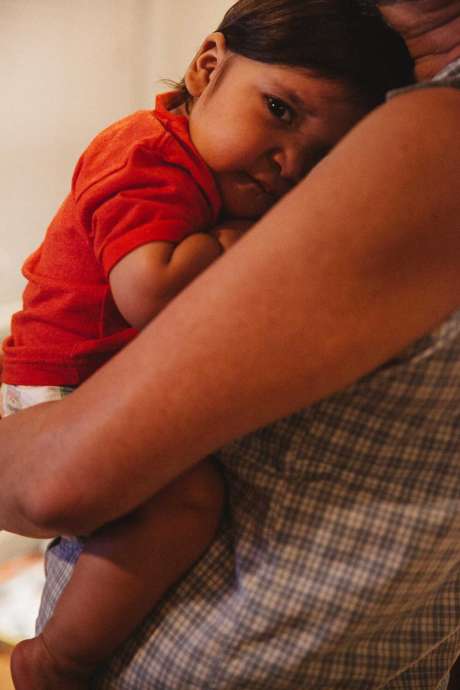Noah Zavala was born with hypoplastic left heart syndrome, has battled through two open heart surgeries and will need a heart transplant at some point in his life. After months of being in the hospital, Noah lost his ability to swallow and was so weak he couldn’t hold his head up.
But after receiving physical, occupational and speech therapy, 1-year-old Noah eats pureed baby food on his own and no longer needs a feeding tube. He has learned to say “mama” and babbles happily. He’s able to sit on his own and is learning how to crawl.
“He can now turn the pages of the book and push a button so his toys can make noises,” said Jennifer Zavala, Noah’s mom. “What parents take for granted in these baby milestones, for us it’s a huge deal.”
Now, Zavala is concerned that this year’s legislative session may not restore cuts to Medicaid reimbursement rates for therapists who serve disabled children. As the House works on a plan that would partly reverse the controversial cuts, implemented in December, the Senate will not back down on the lowered therapy rates, adding yet another fight between budget writers during the legislative session.
“(With therapy cuts) we project a $200,000 loss of revenue this fiscal year. We are just able to keep our heads above the water,” said Linda Tapia, CEO of Easter Seals, one of the three Early Childhood Intervention therapy providers in San Antonio. “This is going to increase special education services in school districts. They will take on the costs to staff enough teachers and gather enough therapists because kids did not receive (therapy) as toddlers.”
Tapia said her agency, which serves children such as Noah with developmental delays, already is providing services to 151 children more than the 1,308 they are contracted by Texas to serve.
The budget approved in 2015 directed the Texas Health and Human Services Commission to achieve savings in therapy services under Medicaid by cutting $150 million in state funds and $200 million in federal funds. But the agency was prevented from implementing the cuts until Dec. 15, more than a year after lawmakers approved them, because a group of home health providers and parents sued to stop the cuts, which they said would affect as many as 60,000 children statewide.
House Bill 1, the House budget for the next biennium, would appropriate $118.9 million to help restore that funding for 2018-19, both state and federal, for therapy rate adjustments.
House Bill 2, the supplemental appropriations bill, would provide $21.5 million to offset the cuts made in December.
The House budget and the supplemental bill passed the House Appropriations Committee last week and are scheduled to be debated by the full chamber today.
The Senate, however, has taken no steps in their two-year budget proposal to increase rates for medical providers, nor does it fund any other special program to mitigate the impact of last session’s cost containment section.
State Sen. Carlos Uresti, D-San Antonio, a member of the Senate Finance committee, said addressing therapy rate cuts is important to rural areas of his district that are historically underserved by providers.
“While the Senate has yet to consider restoring the cuts, the House has made (it) part of their supplemental budget bill,” he said in a statement. “I look forward to making the case for why we need to undo these cuts and preserve the access that we originally required for the sake of our disabled children.”
Stephanie Rubin, CEO of advocacy group Texans Care for Children, said numerous families have already testified in House and Senate hearings over many hours about the loss of therapy services or gaps because state budget cuts forced their children’s therapists to cut back or go out of business.
“The impacts are real and felt all over the state with signs that families in rural areas may be suffering the most,” she said. “Unless the Legislature restores funding for therapies, more kids will be left without the support they need to thrive and be ready for school.”
Rubin said Early Childhood Intervention is affected on two fronts: the Medicaid cuts for children’s therapies, since ECI provides it exclusively to toddlers younger than 3; and the fact that no budget is funding a $19 million appropriations request from the commission to cover expected ECI enrollment growth.
State legislators have cut funding for the intervention program by 11 percent in the past seven years, according to a report by Rubin’s group. The number of organizations contracting has declined from 58 in 2010 to 47 today, the study said.
Tapia, the CEO of Easter Seals, said they have cut mileage reimbursement rates for therapists, frozen salaries and cut supply budgets to an absolute minimum.
“The biggest problem is a lack of ECI funding,” she said. “The Medicaid cuts are an additional burden.”
Published by: San Antonio Express-News
Author: Elena Mejia Lutz
Original link: http://www.expressnews.com/news/local/article/Unlike-the-Senate-budget-House-aims-to-partially-11053698.php
